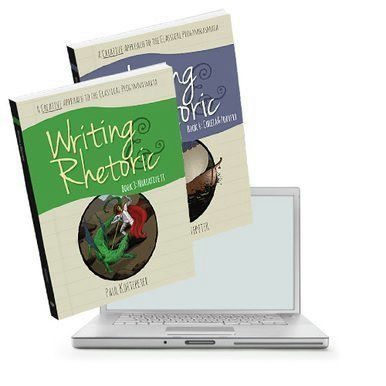Writing and Rhetoric 2

Required Materials:
Books and supplies are not included in the purchase of the course.
- Writing & Rhetoric Book 3: Narrative II (Student Edition)
- Writing & Rhetoric Book 4: Chreia & Proverb (Student Edition)
Optional Resources:
- Writing & Rhetoric Book 3: Narrative II Audio Files
- Writing & Rhetoric Book 4: Chreia & Proverb Audio Files
These audio files allow students to engage their sense of hearing and their listening intelligence as Dr. Christopher Perrin, along with the Writing & Rhetoric series editor, Christine Perrin, deliver the historical narrative, myths, and legends aloud in a thoughtful manner.

Caeli Lanzilotti
[email protected]Caeli Lanzilotti lives in Northern VA with her husband and two-year-old son. She is passionate about the Liberal Arts and pursuing a life fully realized. She has taught Ancient, American, and World Literature to 9th-12th graders in a private school setting for the past six years. Before moving to VA, she taught Middle School Literature-History, English grammar, and Religion for six years at a small classical school near Philadelphia. She loves the classical model of education, and she is deeply indebted to her former students and colleagues from whom and with whom she has learned so much about the virtuous life. She holds an MA in teaching and a BA in English with a minor in Philosophy. For leisure, she loves trail running and hiking in the woods with her husband, swimming, and baking.

Kara Lobley
[email protected]Kara Lobley, enjoys finding answers and imparting those discoveries to everyone. This passion for truth inspired her to earn her bachelor’s degree in history at Patrick Henry College (PHC), in Purcellville, VA. The classical experience at PHC and her own experience being homeschooled outside the classical tradition (K-12) showed Kara the beauties of each approach. She delights in witnessing how classical homeschooling equips students to identify and discover “the true, the good, and the beautiful” in the world around them and to share those revelations with others.
Kara began working with children as a high schooler at children’s theater camps and at her church’s Vacation Bible Schools. During college and post-graduation, she spent five years as a high school writing tutor and one year as a preschool teaching assistant. Kara has spent the past three years teaching lower school Well-Ordered Language and Writing and Rhetoric with Scholé Academy and is excited to return for a fourth year this year. Outside of the classroom, Kara can be found reading, hiking, or singing.

Kate Weise
[email protected]Kate Weise has worked as a teacher or school administrator for the last 15 years and has experience working with students from early childhood to the graduate level. Her favorite things to teach are literature and writing (although math ranks up there). Most recently, she helped launch an urban, Classical Christian school where she worked primarily in curriculum development and academic support. She believes any student can fall in love with learning and loves helping them embrace their unique giftings as God’s image bearers. She holds degrees in History and Writing from Union University and an M.F.A. in Writing from Vermont College of Fine Arts. She and her husband have three children, and it has been such a gift to be teaching with Schole Academy during this season of their lives.

Stephen Williams
[email protected]Stephen Williams once told his longsuffering, homeschooling mother that his future job would never depend on his ability to write in cursive or diagram a sentence. Similarly, he spent over a decade swearing that he would never enter pastoral ministry, yet he is nonetheless now creeping towards a decade in the classroom while pursuing theological studies at Beeson Divinity School in preparation for the Anglican priesthood.
Stephen has had the privilege of being shaped by several classical institutions throughout the course of his life, most notably his alma mater, Patrick Henry College, which exposed him to the glories of the Western Canon and began to grow in him a love of literature, history and theology. After a season spent in campus ministry at PHC, he stumbled into a teaching career that has spanned the elementary, middle, and high school levels, turning him into an amateur medievalist, Inklings enthusiast, and subject-matter expert on the psyches of middle school boys. Rumor has it that he sleeps with a baseball and a copy of Tolkien’s The Silmarillion under his pillow each night.
When he doesn’t have his head in a book, Stephen enjoys hiking, dabbling in poetry and cooking, and cheering on the St. Louis Cardinals with his brilliant and hilarious wife and fellow Scholé instructor, Sarah Williams.
Quarter 1
Writing and Rhetoric Book 3: Narrative II
- Define story & narrative
- Identify & review narrative types
- Practice logos and lexis as rhetorical strategies
- Introduce outlining and story hooks
- Focus on protagonist, character traits, and point of view
Quarter 2
Writing and Rhetoric Book 3: Narrative II
- Explore antagonist and story conflict
- Introduce highlighting & fact versus fiction
- Learn the 5 Ws and an H as vital story components
- Write a historical fiction Narrative
- Introduce chreias & proverbs
Quarter 3
Writing and Rhetoric Book 4: Chreia & Proverb
- What is a Chreia?
- Explore Literal and Figurative Language in Proverbs
- Topic Sentence, Structure, and Order in a Paragraph
- Write the Chreia about Important Historical Figures Who Embodied Classical Virtues
Quarter 4
Writing and Rhetoric Book 4: Chreia & Proverb
- Practice Oration, Elocution, and Inflection
- Drafting, Proofreading, and Revision
- Increase Proficiency in Writing Chreia
![]() Computer: You will
need a stable, reliable computer, running with a processor with a speed of 1 GHz or better
on one of the following operating systems: Mac OS X with Mac OS 10.7 or later; Windows 8,
7, Vista (with SP1 or later), or XP (with SP3 or later). We do not recommend using an
iPad or other tablet for joining classes. An inexpensive laptop or netbook would be much
better solutions, as they enable you to plug an Ethernet cable directly into your computer.
Please note that Chromebooks are allowed but not preferred, as they do not support certain
features of the Zoom video conference software such as breakout sessions and annotation,
which may be used by our teachers for class activities.
Computer: You will
need a stable, reliable computer, running with a processor with a speed of 1 GHz or better
on one of the following operating systems: Mac OS X with Mac OS 10.7 or later; Windows 8,
7, Vista (with SP1 or later), or XP (with SP3 or later). We do not recommend using an
iPad or other tablet for joining classes. An inexpensive laptop or netbook would be much
better solutions, as they enable you to plug an Ethernet cable directly into your computer.
Please note that Chromebooks are allowed but not preferred, as they do not support certain
features of the Zoom video conference software such as breakout sessions and annotation,
which may be used by our teachers for class activities.
![]() High-Speed Internet Connection:
You will also need access to high-speed Internet, preferably accessible via Ethernet
cable right into your computer. Using Wi-Fi may work, but will not guarantee you the optimal
use of your bandwidth. The faster your Internet, the better. We recommend using a connection
with a download/upload speed of 5/1 Mbps or better. You can test your Internet connection here.
High-Speed Internet Connection:
You will also need access to high-speed Internet, preferably accessible via Ethernet
cable right into your computer. Using Wi-Fi may work, but will not guarantee you the optimal
use of your bandwidth. The faster your Internet, the better. We recommend using a connection
with a download/upload speed of 5/1 Mbps or better. You can test your Internet connection here.
![]() Webcam: You may
use an external webcam or one that is built in to the computer. Webcam Recommendations:
Good (PC only) | Best (Mac and PC)
Webcam: You may
use an external webcam or one that is built in to the computer. Webcam Recommendations:
Good (PC only) | Best (Mac and PC)
![]() Headset: We recommend
using a headset rather than a built-in microphone and speakers. Using a headset reduces the
level of background noise heard by the entire class. Headset Recommendations: USB | 3.5mm
Headset: We recommend
using a headset rather than a built-in microphone and speakers. Using a headset reduces the
level of background noise heard by the entire class. Headset Recommendations: USB | 3.5mm
![]() Zoom: We use a web
conferencing software called Zoom for our classes, which enables students and teachers to
gather from around the globe face to face in real time. Zoom is free to download and easy
to use.
Zoom: We use a web
conferencing software called Zoom for our classes, which enables students and teachers to
gather from around the globe face to face in real time. Zoom is free to download and easy
to use.  To
download Zoom:
To
download Zoom:
- Visit zoom.us/download.
- Click to download the first option listed, Zoom Client for Meetings.
- Open and run the installer on your computer.
- In August, students will be provided with instructions and a link for joining their particular class.
![]() Scanner: In this
class, students frequently submit homework assignments by scanning pages from their workbooks.
Students and/or their parents should have easy access to a scanner and the ability to use it.
Scanner: In this
class, students frequently submit homework assignments by scanning pages from their workbooks.
Students and/or their parents should have easy access to a scanner and the ability to use it.
Step 1
Step 2
Step 3
Step 4
Explore our courses!
First, read the available course descriptions, noting prerequisites, target grades, and course objectives. If you think your student is prepared for the course, go ahead and register. After registration, a placement assessment may be provided to students, depending on the course and the student’s previous enrollment with Scholé Academy. Registration is finalized when the student’s placement assessment has been returned by the course instructor with placement confirmation.
All Courses | By Grade
Read the Student-Parent Handbook.
Please take careful note of our teaching philosophy, our technology requirements, our school policies, the parent agreement, and the distinctions between our grade levels.
Double-check the course section dates and times.
Make sure they don't conflict with other activities in your schedule or other courses you are purchasing. Our system will not catch double-bookings!
You're ready to add course selections to your cart!
Our Assistant to the Principal will be in touch with you after your enrollment to help you with next steps, including any placement evaluations that may be required for your course selections.
This registration will be finalized when the student's placement assessment has been returned by the course instructor with placement confirmation.
